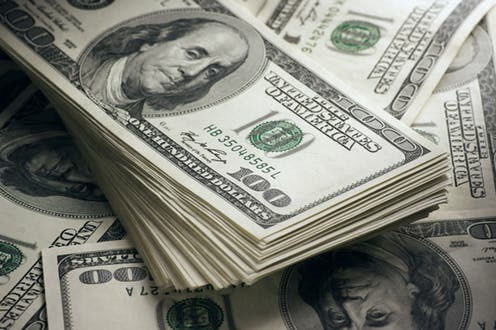Jackson Hole
Bank of England Governor Mark Carney took aim at the U.S. dollar’s “destabilizing” role in the world economy on Friday and said central banks might need to join together to create their own replacement reserve currency.
Federal Reserve Chair Jerome Powell and Governor of the Bank of England, Mark Carney chat during the three-day “Challenges for Monetary Policy” conference in Jackson Hole, Wyoming, U.S., August 23, 2019. REUTERS/Jonathan Crosby
The dollar’s dominance of the global financial system increased the risks of a liquidity trap of ultra-low interest rates and weak growth, Carney told central bankers from around the world gathered in Jackson Hole, Wyoming, in the United States. “While the world economy is being reordered, the U.S. dollar remains as important as when Bretton Woods collapsed,” Carney said, referring to the end of the dollar’s peg to gold in the early 1970s.
Emerging economies had increased their share of global activity to 60% from around 45% before the financial crisis a decade ago, Carney said.
But the dollar was still used for at least half of international trade invoices – five times more than the United States’ share of world goods imports – fuelling demand for U.S. assets and exposing many countries to damaging spillovers from swings in the U.S. economy. Carney – who was considered a candidate to be the next head of the International Monetary Fund but failed to secure backing from Europe’s governments – said the problems in financial system were encouraging protectionist and populist policies.
Earlier on Friday, U.S. President Donald Trump said he was ordering U.S. companies to look at ways to close their operations in China, the latest escalation of mounting trade tensions between Washington and Beijing. Carney warned that very low equilibrium interest rates had in the past coincided with wars, financial crises and abrupt changes in the banking system.
As a first step to reorder the world’s financial system, countries could triple the resources of the IMF to $3 trillion as a better alternative to countries protecting themselves by racking up enormous piles of dollar-denominated debt. “While such concerted efforts can improve the functioning of the current system, ultimately a multi-polar global economy requires a new IMFS (international monetary and financial system) to realize its full potential,” Carney said.
China’s yuan represented the most likely candidate to become a reserve currency to match the dollar, but it still had a long way to go before it was ready. The best solution would be a diversified multi-polar financial system, something that could be provided by technology, Carney said.
Facebook’s (FB.O) Libra was the most high-profile proposed digital currency to date but it faced a host of fundamental issues that it had yet to address. “As a consequence, it is an open question whether such a new Synthetic Hegemonic Currency (SHC) would be best provided by the public sector, perhaps through a network of central bank digital currencies,” Carney said.—Reuters









